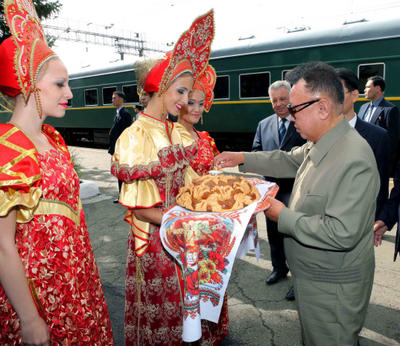This year, Russia — like China in the recent past — confirmed its opposition to the DPRK’s complete isolation. This includes excessively broad interpretations of UN Security Council sanctions against the country. Russia considers that, whatever the circumstances, sanctions should not hurt the civilian sector of the economy. And this view, combined with Russia’s own national interests aimed at integration into the East Asian regional cooperation process, led Moscow to expand cooperation with North Korea in a number of ways.
But some reactions to the warming of relations between Russia and the DPRK were far from positive. The agreement to launch joint Russia-North Korea search and rescue naval exercises in 2012 appears to be the only component of the massive package of bilateral agreements to draw observers’ attention. Washington, Tokyo, and Seoul each seem to have forgotten that their key objective — to bring North Korea back to the negotiating table — was accomplished through Russian diplomacy, and that now is an opportune moment to contribute to this recovery.
Instead, the US Department of State expressed concern over Russia’s contacts with North Korea in military affairs, stressing that they should not obscure the message sent by the international community: that Pyongyang’s military programs are a problem and that it should return to the Six-Party Talks.
Policy analysts went even further and interpreted Moscow’s openness to joint semi-military exercises with North Korea as a step toward a new Cold War in Northeast Asia, or an attempt to neutralise US, ROK and Japanese influence on the Korean Peninsula. These comments are full of out-dated preconditions that are aimed at gauging exactly how serious North Korea is about returning to the negotiating process. But during the inter-Korean Foreign Ministry-level consultations held in Beijing on 21 September 2011, the ROK’s representatives failed to budge from an inflexible approach to resuming the talks, and no progress was made there either.
It seems that Western analysts are deliberately ignoring the fact that the planned Russia-North Korea naval exercises are a small-scale effort of a purely humanitarian nature with no armaments involved. Compare this to the exercises continually carried out by US and ROK armed forces, often in direct proximity to North Korea’s borders. In this context, it is difficult to understand why the former is a threat to stability across the Korean Peninsula and the latter — the markedly militant games of much greater proportions played by the US and ROK which culminated in inter-Korean clashes last year — is a contribution to stability.
It is also unfortunate that certain circles in Japan and South Korea are ready to denounce the gas pipeline construction plan that was discussed in Ulan-Ude. ROK President Lee Myung-bak’s positive approach to the gas pipeline changed drastically to a more negative position immediately after a meeting in Washington on 6 October 2011 — a striking and disappointing outcome. It is both unfair and paradoxical to criticise the project, which is clearly aimed at strengthening multilateral economic cooperation, as somehow undermining this same objective.
A question arises about the West’s real priorities in the course of analysing its response to the Ulan-Ude summit. Engagement and dialogue are traditionally considered the optimal strategy if non-proliferation is the key objective — whereas attempts to isolate the opponent, add pressure and struggle for dominance suggest regime change is more likely the end goal.
The West’s reaction to the Ulan-Ude summit shows that its stated commitment to non-proliferation and its actual intentions are worlds apart, and that a hidden agenda built around regime change in the DPRK still exists. If this is the case, any initiatives aimed at helping Pyongyang — for example, those which invite it into negotiations or multilateral economic projects — are going to meet with resentment in the West. Only time will tell how long the unrealistic hopes for regime collapse in North Korea will continue to cast a shadow over the inter-Korean settlement.
Alexander Vorontsov is Head of the Korean and Mongolian Studies Department at the Institute of Oriental Studies, Russian Academy of Sciences.

